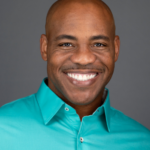Tanya Menon

Widen Your Social Universe
Topic Categories:
- Communication, Diversity, Equity and Inclusion (DE&I), Innovation, Teamwork, TED, Virtual Presentations
Tanya Menon speaks, writes and consults on collaboration. Her research focuses on how people think about their relationships and the habits that allow them to build positive connections with other people. She has taught tens of thousands and MBA students and executives for over two decades in some of the top business schools worldwide and has consulted and given keynotes for numerous Fortune 500 companies.
- Organizational Psychologist and Professor of Management and HR at Fisher College of Business, Ohio State University
- Author of Stop Spending, Start Managing: Strategies to transform wasteful habits (2016,Harvard Business Review Press)
- Her Ted talk reached over 1.8 Million views and was named top 7 TED talks of 2018 by entrepreneur.com, and one of TED.com’s most popular talks of 2018.
- Tanya is a research expert that helps attendees focus on influence, persuasion, and negotiation to improve internal (team members) and external (clients/customers) communications.
- She provides the “how to” on collaboration: getting people to think about the design of their teams, including issues of diversity and ensuring synergies to get the most value from teammates.
- Tanya’s presentation provides value with networking and innovation: how networks within organizations can either create barriers or facilitate opportunities/solutions/innovation.
- Top Researcher on HOW TO Create a Better Workplace
*Fee ranges are presented as a guideline only. Speaker fees are subject to change without notice. For an exact quote, please contact your Speaker Exchange Agency representative.
Tanya Menon is Professor of Management and Human Resources at Fisher College of Business, Ohio State University. Her research has been cited in various media outlets including NPR, the Wall Street Journal, Boston Globe, The Chicago Tribune, The Times of London (UK), and The Guardian (UK). She has won multiple teaching awards (at both Ohio State and University of Chicago, where she was previously Associate Professor).
She has conducted corporate training, keynotes, and consulting all over the world (including the US Intelligence Community, Discover Financial Services, CareerBuilder.com, Wright Patterson Air Force Base, McKinsey Academy, Walmart, DHL, Petrobras, Mondelez, McDonalds, Cummins, Express, Scotts, Citibank (India), Tetrapak (Italy), Aetna, Sherwin Williams, Erie Insurance, McCormick, the Environmental Protection Agency, American Bar Association Chief Bar Executives, Ronald McDonald House Charities, and the Deloitte Women’s group). She is currently Associate Editor at Management Science Journal, was an elected member of her college’s executive committee, and is a member of the university’s Faculty Senate diversity committee (and incoming chair).
She wrote a book with Dr. Leigh Thompson, Stop Spending, Start Managing: Strategies to transform wasteful habits (2016, Harvard Business Review Press).
Her Ted talk has reached over 2.2 Million views and was named as one of the “top 7 TED talks of 2018” by entrepreneur.com, and one the most popular Ted talks of 2018 by TED playlists.
Humans are pattern-forming creatures—a skill that allows us to predict the future and survive. Pattern recognition is even part of IQ tests! It also is a mindset that is a barrier to innovation. We rapidly find the pattern (often the first thing that comes to mind), engage in a confirmatory path to collect information and go.
In this session, I will talk about creating a different mindset—seeing multiple patterns at the same time in an exploratory process. It is an open minded approach that doesn’t rush to closure. I will share with participants a few games that illustrate rapid pattern formation. We’re fast to the hypothesis, then we collect the data to confirm it.
We then engage in activities that put the mind on a very different channel: opening up and exploring in a way that’s exciting and inspiring. But the truth is—this approach can also be irritating when we want to drive to closure and action.
We then measure how people vary in a simple personal difference—need for structure. There’s much diversity on this in teams and it creates conflict especially as we balance creative exploration with closure and action. Are you a fast driver who gets on a clear path, sees the goal, and gets to their destination quickly? Or are you the one who’s perfectly comfortable aimlessly wandering without a clear path or even goal? And finally, how can these mindsets work together?
Tanya’s an award-winning professor who’s taught tens of thousands of MBA students and executives for over two decades in some of the top business schools worldwide, and has consulted and given keynotes for numerous Fortune 500 companies. Her TED talk on networking was one named one of the most popular of 2018.
Based on her co-authored book (Stop Spending, Start Managing, Harvard Business Review Press) and her research, Tanya’s information-packed sessions are designed to make collaboration fun and productive. The sessions are interactive, humorous, and full of memorable stories, but the star of the show will be the evidence based approaches proven to make you work smarter! Her goal is to transform how you think about organizing—so that you can discover your creative potential! This session works for both large-scale meetings—and small teams.
Potential learning objectives
- Problem finding vs. problem solving interactive exercise
- Know your personal mindset—and what irritates you (driving too fast or aimless wandering?). Recognize when each matter, and especially for those who like to drive fast: learn to appreciate the lack of structure, ambiguity, confusion as the places where novelty will arise.
- Simple changes that will allow you to capture new patterns vs. rush to the same old ones. It might not be what you expect to see or hear—but it’s something new that others haven’t even detected yet.
One of the most frustrating parts of work is seeing a beautiful idea die in some slide deck. Or seeing a sale slip away when you know that you have the right offering for the customer.
Influence failures are a particularly sore spot for smart people. Tanya taught one of the most popular classes at the University of Chicago’s Booth School of Business on Power and Influence for over a decade. She met brilliant and analytic executives who often hoped that they could just show people their data and superior thinking—and that would be enough to instantly change minds.
This session is about showcasing your great ideas so that others will come along too. How can you frame your ideas, build acceptance for them, and drive others to act upon them?
At its core, this session is about being human—and the takeaways are for home as well as work.
Based on her co-authored book (Stop Spending, Start Managing, Harvard Business Review Press) and her research, Tanya’s information-packed sessions will help you re-design your messages so that they are likely to gain acceptance. The sessions are interactive, humorous, and full of memorable stories, but the star of the show will be the evidence based approaches proven to make you influence more effectively!
Tanya has run this session for both large-scale national sales meetings—and C-suite teams. The session can vary in level of interaction—with exercises or a lecture that guides you to workshop a persuasion effort you’re managing right now.
Potential learning objectives:
- Learn Tanya’s three part model of persuasion: ego (make your way psychologically easy for people), social (fit the message to the group/culture), and physical (use behavioral channels to convert intention to action)
- Recognize the barriers to influence: we end up trying to impose or will on the other person—rather than opening up a conversation; we go either too negative or positive, and get agreement but not action)
- Get immediate insight on your own approach to influence
- Learn to ask good questions to learn and shape the conversation vs. tell and control
- When to go for the big, inspiring idea—and when to try deal making instead
- Recognize when persuasion has become conflict—and how to move past it in productive ways.
- What are the unique challenges women face as they own their voice with power and influence?
One of Tanya’s favorite questions to ask people is how they got into their line of work. Or, how they met their significant other. Behind these major life decisions, we often discover an incredible story of networks and relationships.
And, while people love to share these stories of opportunity that transformed their careers and life course—they are also ambivalent about networking. They feel that networking is icky—violating the ways people with good taste connect with others—based on ‘using’ others for particular ends, not respecting them as an ends in themselves.
Tanya’s an award-winning professor who’s taught tens of thousands of MBA students and executives for over two decades in some of the top business schools worldwide, and has consulted and given keynotes for numerous Fortune 500 companies. Her TED talk on networking was one named one of the most popular of 2018.
Based on her co-authored book (Stop Spending, Start Managing, Harvard Business Review Press) and her research, Tanya’s information-packed sessions are designed to make collaboration fun and productive. The sessions are interactive, humorous, and full of memorable stories, but the star of the show will be the evidence based approaches proven to improve how you organize. She’s run this session for both large-scale meetings—and small teams.
Potential learning objectives
- What’s your networking mindset? Is it stopping you from building the relationships you need to thrive at work?
- Seeing and understanding the hidden organization below the org chart
- How can you use networks to understand your position in an organization and potential for influence?
- How can you think intentionally about building structures around you that maximize your access to new ideas—even when you’re working from home or in different geographies?
- How can you also ensure that you have social support at work?
- What are the unique challenges women/minorities face as they build relationships?
This session is for anyone who’s suffered through too many hours in unproductive meetings or on teams that don’t reach their potential. How can we stop squandering collective talent and start creating high value collaboration? And how do we should we think about collaboration today, as our work arrangements have been transformed?
Tanya’s an award-winning professor who’s taught tens of thousands of MBA students and executives for over two decades in some of the top business schools worldwide, and has consulted and given keynotes for numerous Fortune 500 companies. Her TED talk was one named one of the most popular of 2018.
Based on her co-authored book (Stop Spending, Start Managing, Harvard Business Review Press) and her research, Tanya’s information-packed sessions are designed to make collaboration fun and productive. The sessions are interactive, humorous, and full of memorable stories, but the star of the show will be the evidence based approaches proven to help you collaborate better. Her goal is to transform how you think about organizing—so that your smart people can become smart groups. She’s run this session for both large groups of 100s of participants—and small C-suite teams.
The session will be highly interactive with short group exercises. The topic could be a one hour intro or 20 hours! Regardless, it will surface the dangerous processes that squander your group’s talents, and provide you with immediate fixes that transform the way you work.
Potential learning objectives:
- What are your assumptions about teams?
- The two most dangerous people in groups—the persuasive idiot and the quiet expert—and how to foil them.
- What norms that have implicitly shaped how your group functions—and can you be intentional about setting more productive norms?
- Knowing when to be a group and when to be an individual
- How do you maximize the diversity of voices that are heard?
- How do you organize the confusion of perspectives—and then pick the best ideas?
- Remote work
Identify Relationship Failure – Tanya Menon (Studies Behavior, Relationships, and Habits) from Keep On Speaking On on Vimeo.
Motives of a Leader – Tanya Menon (Studies Behavior, Relationships, and Habits) from Keep On Speaking On on Vimeo.
No Stats All Stars – Tanya Menon (Studies Behavior, Relationships, and Habits) from Keep On Speaking On on Vimeo.
Tanya Menon – Extended Clip from Keep On Speaking On on Vimeo.
Tanya Menon TEDtalk: Strategies to widen your Social Universe from Keep On Speaking On on Vimeo.
Want to bring Tanya Menon to your next event? Please tell us a little about your event, and we will get back to you shortly!




